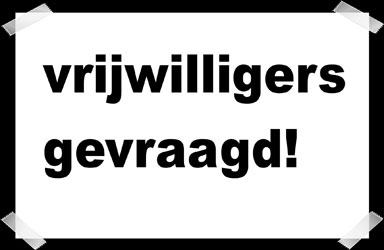 Een grondige analyse van de vijf meest spraakmakende studies van het Nederlands Kenniscentrum Chronische Vermoeidheid (NKCV) toont aan dat de combinatie gedragstherapie en ‘stapsgewijze revalidatie’ (CGT+) geen enkel objectief (positief) effect heeft op de (uitzichtloze) situatie van patiënten met het chronisch vermoeidheidssyndroom (CVS).
Een grondige analyse van de vijf meest spraakmakende studies van het Nederlands Kenniscentrum Chronische Vermoeidheid (NKCV) toont aan dat de combinatie gedragstherapie en ‘stapsgewijze revalidatie’ (CGT+) geen enkel objectief (positief) effect heeft op de (uitzichtloze) situatie van patiënten met het chronisch vermoeidheidssyndroom (CVS).
De uitkomsten van de analyse bevestigen het beeld van de omstreden PACE-trial: de (verregaande) conclusies m.b.t. de veronderstelde positieve effecten van CGT+ worden op geen enkele wijze gerechtvaardigd door de gerapporteerde uitkomsten.
Een recente studie van enkele PACE-trial onderzoekers bevestigt dat ‘stapsgewijze revalidatie’ een negatief effect heeft op een groep patiënten.
Ondanks beweringen van het tegengestelde is het effect van CGT+ in patiënten met Myalgische Encefalomyelitis (ME), een neuromusculaire ziekte, nimmer onderzocht of gerapporteerd.
Echter, gelet op één van de kenmerkende symptomen van ME, langdurige spierzwakte (en spierpijn) na een minimale fysieke inspanning, is het aannemelijk dat CGT+ schadelijk is voor een grote groep patiënten.
Ondanks het ontbreken van bewijs en aanwijzingen dat CGT+ schadelijk is, wordt CGT+ door de Gezondheidsraad sinds 2005 als ‘effectief’ aangeduid en de verwachting is dat ook in het binnenkort te verschijnen adviesrapport ME en CVS, in strijd met de definities, op één hoop gegooid worden, en CGT+ als evidence-based ‘voorkeursbehandeling’ aanbevolen wordt.
Dit is het gevolg van het feit dat de ‘vermoeidheidsdeskundigen’ van het NKCV, die de ‘werkzaamheid’ van CGT+ onderzoeken en actief promoten sinds de eeuwwisseling een hoofdrol spelen in de Gezondheidsraadcommissie.
Gelet op het bewijs dat voorhanden is en de potentiële iatrogene schade van CGT+ is het hoog tijd voor een stevige koerswijziging in Nederland (en België). Het huidige (medische) beleid m.b.t. ME en CVS is een beschaafd land onwaardig.
analyse 5 Nederlandse vermoeidheidsonderzoeken
De analyse van 5 Nederlandse vermoeidheidsonderzoeken toont aan dat cognitieve gedragstherapie met graduele opbouw van activiteiten niet werkzaam is bij ME en CVS. Er is geen bewijs gevonden voor de theorie van de false illness beliefs. Er is geen verband tussen activiteitenniveau en mate van vermoeidheid.
 An analysis of Dutch hallmark studies confirms the outcome of the PACE trial: cognitive behaviour therapy with a graded activity protocol is not effective for chronic fatigue syndrome and Myalgic Encephalomyelitis.
An analysis of Dutch hallmark studies confirms the outcome of the PACE trial: cognitive behaviour therapy with a graded activity protocol is not effective for chronic fatigue syndrome and Myalgic Encephalomyelitis.
Gen Med Open. 2017. 1(3): 1-12. doi: 10.15761/GMO.1000117.
Twisk FNM, Corsius LAMM.
Abstract
Myalgic Encephalomyelitis (ME) and Chronic Fatigue Syndrome (CFS) are considered to be enigmatic diseases.
Several studies propose that the combination of cognitive behaviour therapy with a graded activity protocol (CBT+), justified by a so-called (bio)psychosocial (explanatory) model, is an effective treatment option for CFS (ME).
Objective
A critical review of five Dutch hallmark studies that allegedly support this claim.
Methods
An analysis of the five CBT+ studies with special attention to the patients studied, the criteria (subjective and objective measures and cut-off scores) used to select participants and to define improvement and recovery, the consistency of the definitions of caseness (being diagnosed as a CFS patient at entry) versus the definitions of improvement and recovery after CBT+, and the objective effects.
Results
The studies investigated suffer from various methodological flaws. Apart from these methodological shortcomings, the claim that CBT+ is an effective treatment option for CFS is not substantiated by the data reported.
Some studies investigated CFS patients, other studies investigated CF patients, labelled as CFS patients, or combinations of CFS and CF patients.
No study investigated the effect of CBT+ in a group of patients meeting the (original) diagnostic criteria for ME.
The effects of CBT+ on subjective measures, for example fatigue and disability, if present, are insufficient to achieve normal values.
Impressive recovery and improvement rates are based on very loose criteria for subjective measures.
Cut-off scores for subjective measures used to define improvement and recovery in studies show overlap with cut-off scores for CFS caseness in one or more of the other studies.
More importantly, looking at the objective measures, the proof of clinical improvement after CBT+ is lacking.
Conclusion
Solid evidence of effectiveness of CBT+ for CFS, let alone ME, is lacking in the five hallmark studies.
The lack of objective improvement indicates CBT+ is ineffective.
This conclusion confirms the outcome of the large-scale PACE-trial in the UK.
Keywords:
Myalgic Encephalomyelitis, chronic fatigue syndrome, cognitive behaviour therapy, graded exercise therapy, measures, effectiveness






